Anderson Cooper's Tragedy

Anderson Cooper is one of the preeminent television reporters of our time. As the host of CNN's Anderson Cooper 360, he covers stories ranging from famine in Africa to the elections in Iraq. He is also a special correspondent for the TV newsmagazine 60 Minutes, and The Oprah Winfrey Show, where he has reported on the lives of America's poor and Hurricane Katrina.
Anderson made his mark by telling the raw, emotional stories of people facing a life of adversity. Now he's ready to reveal the deeply personal stories of his own upbringing in the candid memoir Dispatches from the Edge: A Memoir of War, Disasters, and Survival.
Anderson made his mark by telling the raw, emotional stories of people facing a life of adversity. Now he's ready to reveal the deeply personal stories of his own upbringing in the candid memoir Dispatches from the Edge: A Memoir of War, Disasters, and Survival.
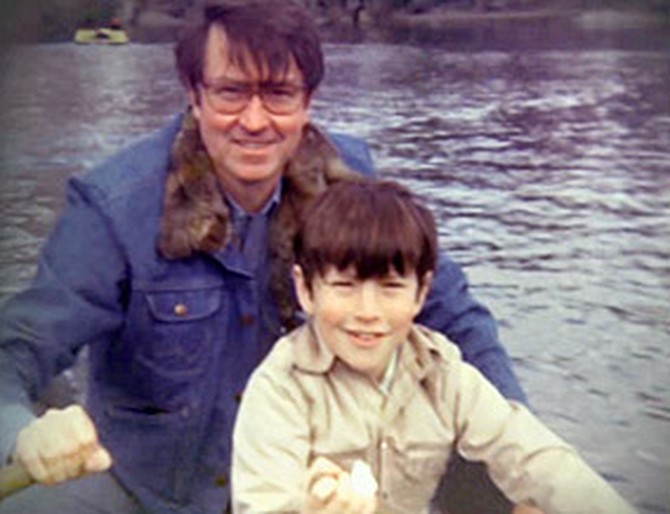
Anderson and his older brother Carter grew up as part of "American royalty." His father was famed author and screenwriter Wyatt Cooper, and his mother is heiress, artist and designer Gloria Vanderbilt.
"There were statues of my great-great-great grandfather [Cornelius] in New York," he says. "I actually thought as a kid that everyone's grandparents turned into a statue when they died." The Vanderbilt family is one of the most famous families of the "Gilded Age." The family amassed their wealth during the expansion of U.S. railroads, and family members were known both for their extravagant lifestyles and their prominent charitable donations.
Despite this high-profile upbringing, Anderson says his parents kept them very grounded, and he didn't quite realize how famous his family was. Instead, he says his life was filled with regular kid things. "My brother and I used to wear costumes all the time," Anderson says. "We were obsessed with military history and so he was always running around in a knight costume and I was wearing a beefeater's hat like a British soldier."
This innocence did not last. When Anderson was 10 years old, his father died during an open-heart surgery operation. "Suddenly the world seemed a very scary place," he says. "In many ways the person that I was seemed to disappear then, and sort of this new person was formed out of that."
"There were statues of my great-great-great grandfather [Cornelius] in New York," he says. "I actually thought as a kid that everyone's grandparents turned into a statue when they died." The Vanderbilt family is one of the most famous families of the "Gilded Age." The family amassed their wealth during the expansion of U.S. railroads, and family members were known both for their extravagant lifestyles and their prominent charitable donations.
Despite this high-profile upbringing, Anderson says his parents kept them very grounded, and he didn't quite realize how famous his family was. Instead, he says his life was filled with regular kid things. "My brother and I used to wear costumes all the time," Anderson says. "We were obsessed with military history and so he was always running around in a knight costume and I was wearing a beefeater's hat like a British soldier."
This innocence did not last. When Anderson was 10 years old, his father died during an open-heart surgery operation. "Suddenly the world seemed a very scary place," he says. "In many ways the person that I was seemed to disappear then, and sort of this new person was formed out of that."
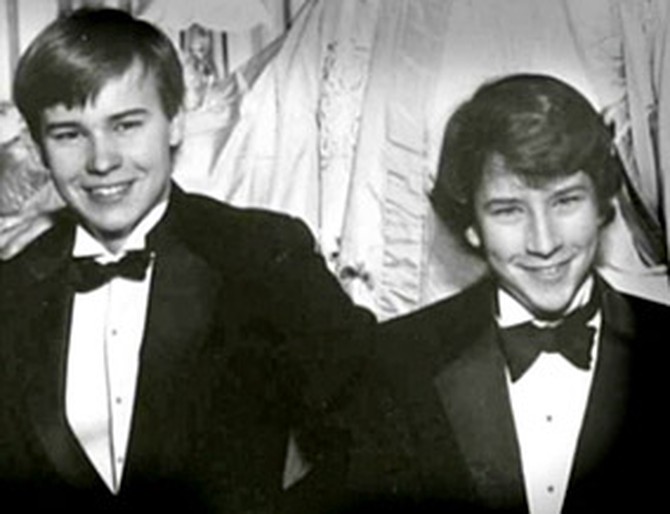
Anderson says he and his brother Carter were close growing up, but after their father's death they didn't spend a lot of time working through their grief together. "My mom would talk about it and talk about [my dad], but I think both my brother and I felt it was really difficult to go there, to talk about it," Anderson says. "The loss was so deep. I sort of felt it easier to kind of run from it than address it and think about it."
Carter took the loss particularly hard, and over the years continued to struggle. When he was 23, shortly after graduating from college, Carter seemed unhappy with his job. He also went through a painful breakup with his girlfriend, Anderson says. Not sure where to turn, Carter moved back to his mother's home.
On July 22, 1988, just 19 days after the last time he saw Carter, Anderson received a shocking phone call from his mom. "He had killed himself," Anderson says. "He'd jumped off the balcony of our apartment building—right in front of my mother."
Carter took the loss particularly hard, and over the years continued to struggle. When he was 23, shortly after graduating from college, Carter seemed unhappy with his job. He also went through a painful breakup with his girlfriend, Anderson says. Not sure where to turn, Carter moved back to his mother's home.
On July 22, 1988, just 19 days after the last time he saw Carter, Anderson received a shocking phone call from his mom. "He had killed himself," Anderson says. "He'd jumped off the balcony of our apartment building—right in front of my mother."
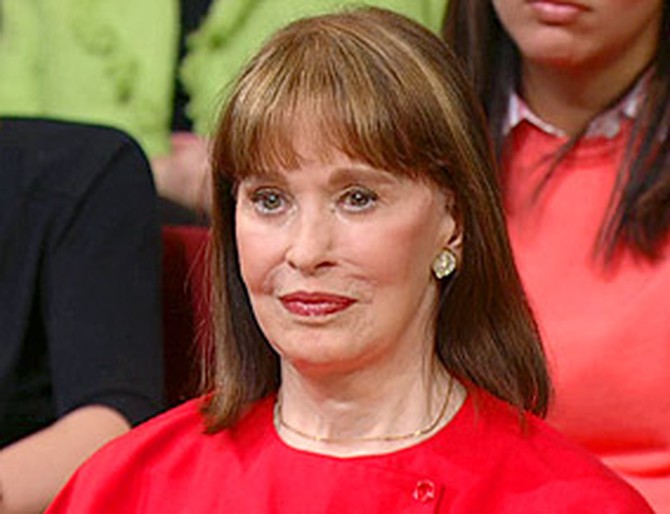
For Gloria, the events of that day seemed surreal. On the evening of July 22, 1988, Carter awoke from a nap at around 7 p.m. and went into his mother's room. "Carter came into the room saying, 'What's going on? What's going on?' It was like he was in a complete daze," Gloria explains.
After telling him nothing was happening, Gloria says Carter ran quickly upstairs to Anderson's room, which was on the 14th story. "When I got up into Anderson's room, he wasn't there. He was out on the balcony, and he was sitting on the ledge," Gloria says. "He had one foot on the ledge ... and the other foot down on the floor."
"Then he started looking over the edge and he started swaying over and looking down," says Gloria. "He said, 'Will I ever feel again?' And I said, 'Carter, I can help you. I can help you. I know about pain and I can help you.'" Realizing that he was about to jump, Gloria tried to coax him away from the ledge. "I said, 'Don't do this to me. Don't do this to Anderson. Don't do this to daddy,'" she says.
Carter then climbed over the ledge, "like a gymnast," Gloria says. He hung there for a second. "I said, 'Carter, come back,'" Gloria says. "And he just let go."
Gloria says she has struggled for 18 years to move forward. "There was a moment I wanted to go over and jump, too. But I didn't. What kept me from going over the edge after him was Anderson," says Gloria.
"You can stay alive and you can go forward. But it takes a very, very, very long time."
After telling him nothing was happening, Gloria says Carter ran quickly upstairs to Anderson's room, which was on the 14th story. "When I got up into Anderson's room, he wasn't there. He was out on the balcony, and he was sitting on the ledge," Gloria says. "He had one foot on the ledge ... and the other foot down on the floor."
"Then he started looking over the edge and he started swaying over and looking down," says Gloria. "He said, 'Will I ever feel again?' And I said, 'Carter, I can help you. I can help you. I know about pain and I can help you.'" Realizing that he was about to jump, Gloria tried to coax him away from the ledge. "I said, 'Don't do this to me. Don't do this to Anderson. Don't do this to daddy,'" she says.
Carter then climbed over the ledge, "like a gymnast," Gloria says. He hung there for a second. "I said, 'Carter, come back,'" Gloria says. "And he just let go."
Gloria says she has struggled for 18 years to move forward. "There was a moment I wanted to go over and jump, too. But I didn't. What kept me from going over the edge after him was Anderson," says Gloria.
"You can stay alive and you can go forward. But it takes a very, very, very long time."
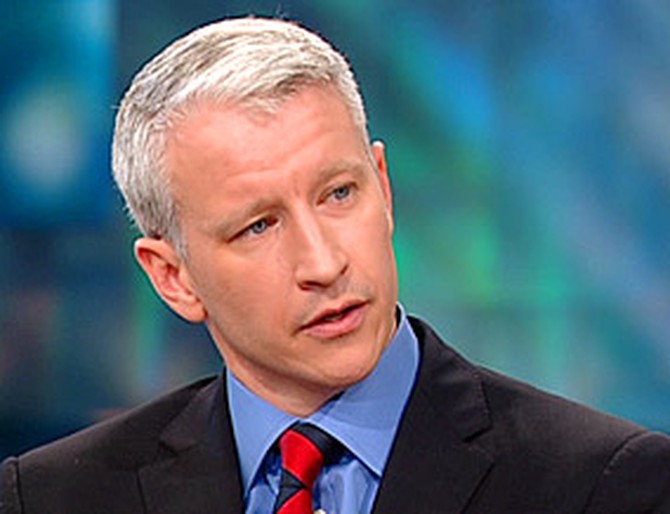
Anderson says that he doesn't believe that Carter had planned to take his life. Carter left no suicide note, and didn't make any indications at the time that he was considering suicide.
"You keep asking that question—'Why?'" Anderson says. "Finally you have to get to a place where sometimes there isn't any why. Sometimes there just is. We probably will never know exactly what it was that went through his mind, but I do think he wasn't himself."
Instead, Anderson is left to speculate. "I think he was depressed over time about a breakup and I think he didn't really communicate with a lot of people in his life," he says.
In speaking with his mom, Anderson says he gained some insight into his brother's tragic decision. "She reminded me of him asking that question, 'Will I ever feel again?' I realized I had been searching for feeling for years and, you know, I just happened to deal with it in a different way than he did."
"You keep asking that question—'Why?'" Anderson says. "Finally you have to get to a place where sometimes there isn't any why. Sometimes there just is. We probably will never know exactly what it was that went through his mind, but I do think he wasn't himself."
Instead, Anderson is left to speculate. "I think he was depressed over time about a breakup and I think he didn't really communicate with a lot of people in his life," he says.
In speaking with his mom, Anderson says he gained some insight into his brother's tragic decision. "She reminded me of him asking that question, 'Will I ever feel again?' I realized I had been searching for feeling for years and, you know, I just happened to deal with it in a different way than he did."
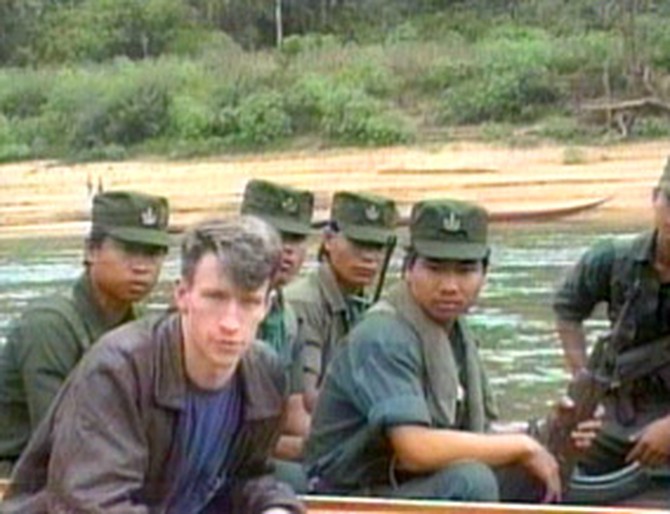
After Carter's death, Anderson says he asked his mom for advice about his future. Her answer was to "follow your bliss."
"In retrospect, 'follow your bliss' is fantastic advice," Anderson says. "The problem [was], I didn't know what [my bliss] was."
After failed attempts at landing a job with ABC News and after a short stint as a researcher for Channel One, a television network aimed at young adults, Anderson decided to take a risk. "I decided, well, if no one's going to give me a chance, I'm going to have to take a chance. And I came up with this plan, which was to go to wars by myself with a home video camera. I figured if I went to places where there weren't many Americans and where other people didn't want to go, then I wouldn't have much competition."
Anderson set off for Southeast Asia, and began shooting news stories, hoping to sell them to Channel One. On his first story, Anderson sneaked across the Thai border to report from war-torn Myanmar, the country formerly known as Burma.
"Right after Burma I realized this is what I wanted to do," he says. "I mean, being able to go places and tell people's stories—it was perfect for me."
"In retrospect, 'follow your bliss' is fantastic advice," Anderson says. "The problem [was], I didn't know what [my bliss] was."
After failed attempts at landing a job with ABC News and after a short stint as a researcher for Channel One, a television network aimed at young adults, Anderson decided to take a risk. "I decided, well, if no one's going to give me a chance, I'm going to have to take a chance. And I came up with this plan, which was to go to wars by myself with a home video camera. I figured if I went to places where there weren't many Americans and where other people didn't want to go, then I wouldn't have much competition."
Anderson set off for Southeast Asia, and began shooting news stories, hoping to sell them to Channel One. On his first story, Anderson sneaked across the Thai border to report from war-torn Myanmar, the country formerly known as Burma.
"Right after Burma I realized this is what I wanted to do," he says. "I mean, being able to go places and tell people's stories—it was perfect for me."

In 1994, at age 26, Anderson flew to Africa to cover the Rwanda genocide. In a clash that lasted just 100 days, Hutu militias unleashed a bloody campaign of rape, murder and torture against ethnic Tutsis and moderate Hutus. An estimated 500,000 to 1 million Rwandans were murdered. "Scattered throughout the countryside you find the bodies. Five people lay in a row. Family, perhaps. You stare at the bodies, try to make sense of it, search for answers. But you find none. All you find are more bodies," Anderson reported.
"Rwanda was really beyond anything I had ever experienced," he says. "I'd seen death and people getting killed, but I mean just the number of bodies and the brutality. It was so intimate. It wasn't bombs and bullets. It was machetes and hacking fingers off of children."
After years of bearing the pain of his father's death and brother's suicide, Anderson says reporting has helped him learn to feel again. "Wherever I go, whether it's a disaster or war, you see people struggling to survive. I've learned so much from them and part of writing the book was to honor their struggle and to honor their stories."
"Rwanda was really beyond anything I had ever experienced," he says. "I'd seen death and people getting killed, but I mean just the number of bodies and the brutality. It was so intimate. It wasn't bombs and bullets. It was machetes and hacking fingers off of children."
After years of bearing the pain of his father's death and brother's suicide, Anderson says reporting has helped him learn to feel again. "Wherever I go, whether it's a disaster or war, you see people struggling to survive. I've learned so much from them and part of writing the book was to honor their struggle and to honor their stories."
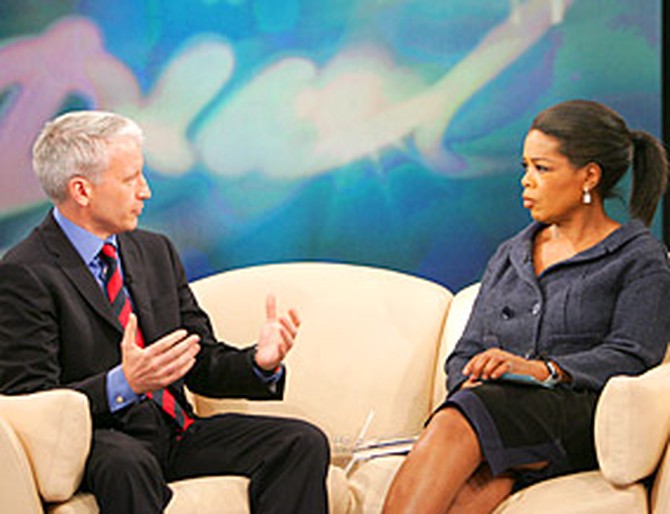
Another story that had a profound effect on Anderson was the story of Terry Schiavo, a St. Petersburg, Florida, woman whose medical circumstances fueled legal battles over life-prolonging procedures. Her case garnered intense media attention.
"I suddenly looked at these hordes of reporters following her family—her grieving family—and I flashed back to when I was bringing my mom to see my brother's body at the funeral home," Anderson says. "These reporters were hanging outside waiting to get pictures, and I remember when I was a kid just hating them for doing that, and just hating them for intruding on our privacy. I realize now they had a job to do—but suddenly [when] I was outside Terry Schiavo's hospice watching this mob of reporters following her family, I thought to myself, 'I've become what I hated. I'm doing what I saw done to me.'
You know, that's a hard thing to sort of realize ... and I never want to forget it—I don't want to forget what it's like to be on the other side of that lens because I think it makes you a better reporter. I think it makes you more informed and more understanding of what people are going through."
"I suddenly looked at these hordes of reporters following her family—her grieving family—and I flashed back to when I was bringing my mom to see my brother's body at the funeral home," Anderson says. "These reporters were hanging outside waiting to get pictures, and I remember when I was a kid just hating them for doing that, and just hating them for intruding on our privacy. I realize now they had a job to do—but suddenly [when] I was outside Terry Schiavo's hospice watching this mob of reporters following her family, I thought to myself, 'I've become what I hated. I'm doing what I saw done to me.'
You know, that's a hard thing to sort of realize ... and I never want to forget it—I don't want to forget what it's like to be on the other side of that lens because I think it makes you a better reporter. I think it makes you more informed and more understanding of what people are going through."
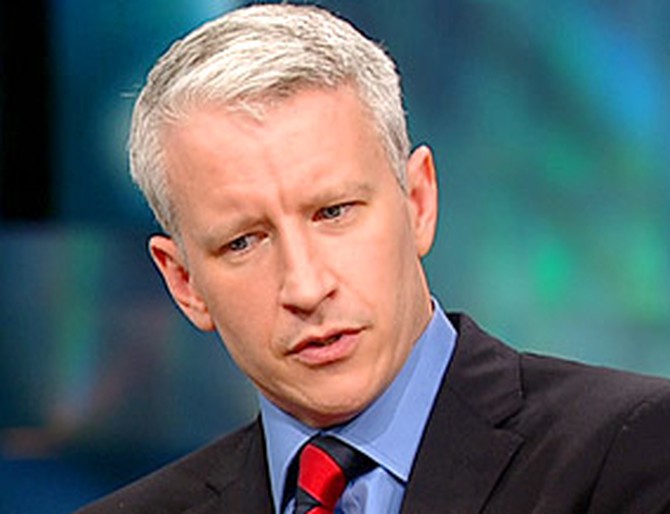
Anderson Cooper's coverage of Hurricane Katrina was a deeply personal experience. "My dad was from Mississippi. He had spent a lot of time growing up in New Orleans," Anderson says. "I spent time there as a kid. To be surrounded by all these places and these things that I had visited with him and then see them in the wake of Katrina, it brought the past and the present together."
Anderson is committed to continuing to give voice to the people of the Gulf States. "I made a promise in those terrible dark days that I would not forget that story," he says. "For me in fact it was not a 'story,' because those people are not characters. This is real life."
It was in the midst of Katrina that Anderson decided to stop running from the past and to tell his own story.
Anderson is committed to continuing to give voice to the people of the Gulf States. "I made a promise in those terrible dark days that I would not forget that story," he says. "For me in fact it was not a 'story,' because those people are not characters. This is real life."
It was in the midst of Katrina that Anderson decided to stop running from the past and to tell his own story.
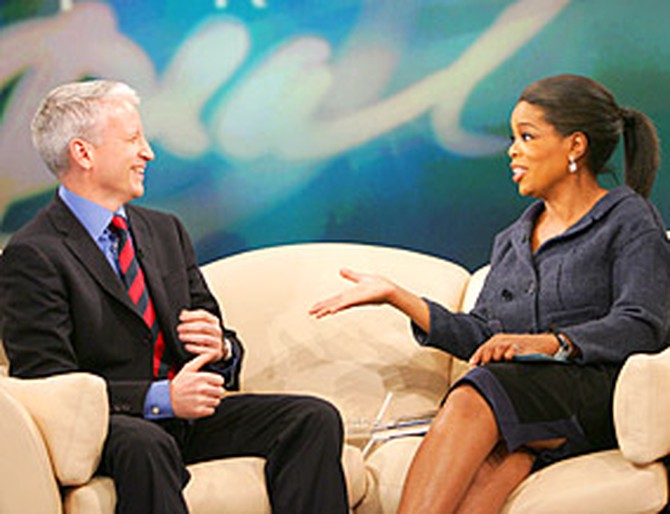
Anderson's memoir, Dispatches from the Edge: A Memoir of War, Disasters, and Survival is incredibly candid and captivating, "a sumptuous feast," says Oprah.
Oprah: It is so good. It is so good. Rarely does a book keep me up. Rarely. Rarely.
Anderson: I've never gotten an e-mail from Oprah [before] but she sent me this e-mail and I got it at like 1 [a.m.] in New York—you must have been in California—and you were saying how you were reading it and you really liked it. I was so excited I couldn't sleep that night. By 6 a.m., I was like, "Do you think she's finished it?"
Oprah: Anderson, this is so funny because I didn't want to make a pest of myself. But, didn't I e-mail you like three times?
Anderson: Four times actually. I have them framed on my wall now.
Oprah: At one point I said, "I have to just calm myself down and stop writing him." I thought, well, let me at least finish it before I write you again. [Dispatches from the Edge] is really, really, really excellent.
Oprah: It is so good. It is so good. Rarely does a book keep me up. Rarely. Rarely.
Anderson: I've never gotten an e-mail from Oprah [before] but she sent me this e-mail and I got it at like 1 [a.m.] in New York—you must have been in California—and you were saying how you were reading it and you really liked it. I was so excited I couldn't sleep that night. By 6 a.m., I was like, "Do you think she's finished it?"
Oprah: Anderson, this is so funny because I didn't want to make a pest of myself. But, didn't I e-mail you like three times?
Anderson: Four times actually. I have them framed on my wall now.
Oprah: At one point I said, "I have to just calm myself down and stop writing him." I thought, well, let me at least finish it before I write you again. [Dispatches from the Edge] is really, really, really excellent.
Published 05/23/2006

